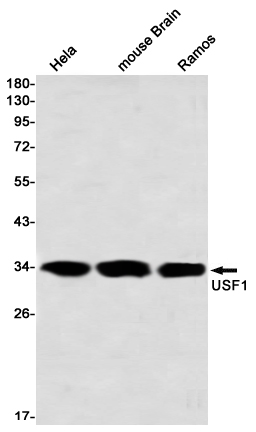
| WB | 1/500-1/1000 | Human,Mouse,Rat |
| IF | 咨询技术 | Human,Mouse,Rat |
| IHC | 咨询技术 | Human,Mouse,Rat |
| ICC | 技术咨询 | Human,Mouse,Rat |
| FCM | 咨询技术 | Human,Mouse,Rat |
| Elisa | 咨询技术 | Human,Mouse,Rat |
| Aliases | UEF; FCHL; MLTF; FCHL1; MLTFI; HYPLIP1; bHLHb11 |
| Entrez GeneID | 7391 |
| WB Predicted band size | Calculated MW: 34 kDa; Observed MW: 34 kDa |
| Host/Isotype | Rabbit IgG |
| Antibody Type | Primary antibody |
| Storage | Store at 4°C short term. Aliquot and store at -20°C long term. Avoid freeze/thaw cycles. |
| Species Reactivity | Human,Mouse |
| Immunogen | A synthetic peptide of human USF1 |
| Formulation | Purified antibody in TBS with 0.05% sodium azide,0.05%BSA and 50% glycerol. |
+ +
以下是关于USF1抗体的3篇参考文献及其摘要概括:
---
1. **文献名称**:*"USF1 regulates insulin gene transcription by interacting with the A3 enhancer element"*
**作者**:S. S. Choung et al.
**摘要**:该研究利用USF1抗体进行染色质免疫沉淀(ChIP)和凝胶迁移实验(EMSA),揭示了USF1通过结合胰岛素基因的A3增强子区域调控其转录,为糖尿病机制研究提供了分子基础。
---
2. **文献名称**:*"Upstream Stimulatory Factor 1 (USF1) binds to the APOE promoter and regulates hepatic apolipoprotein E expression"*
**作者**:T. P. Leren et al.
**摘要**:通过USF1抗体的ChIP-qPCR和siRNA敲减实验,证实USF1直接结合载脂蛋白E(APOE)基因启动子,调控其在肝脏中的表达,提示USF1在脂代谢和动脉粥样硬化中的作用。
---
3. **文献名称**:*"USF1 deficiency modulates chromatin accessibility and mitochondrial metabolism in skeletal muscle"*
**作者**:M. Laakso et al.
**摘要**:研究使用USF1抗体的Western blot和免疫组化技术,发现USF1敲除小鼠骨骼肌中线粒体功能基因表达下调,表明USF1通过表观遗传调控影响能量代谢通路。
---
这些文献均以USF1抗体为核心实验工具,涵盖基因转录调控、代谢疾病及表观遗传机制等领域。如需扩展,可进一步检索ChIP-seq或疾病特异性研究。
USF1 (Upstream Stimulatory Factor 1) is a ubiquitously expressed transcription factor belonging to the basic helix-loop-helix leucine zipper (bHLH-Zip) family. It binds to E-box motifs (CANNTG) in gene promoter regions, often as a heterodimer with USF2. to regulate transcription of target genes involved in diverse cellular processes, including metabolism, cell cycle progression, and stress responses. USF1 plays a critical role in lipid and glucose homeostasis, with studies linking its activity to conditions like diabetes, obesity, and cardiovascular diseases. It also interacts with chromatin-modifying enzymes and participates in epigenetic regulation.
USF1 antibodies are essential tools for investigating its expression, DNA-binding capacity, and interaction partners in molecular and pathological contexts. These antibodies enable techniques such as Western blotting, immunohistochemistry, chromatin immunoprecipitation (ChIP), and immunofluorescence to study USF1's nuclear localization, protein levels, and regulatory mechanisms. Research using USF1 antibodies has revealed its dual role as both an oncogene and tumor suppressor in various cancers, highlighting context-dependent functions. Additionally, post-translational modifications like phosphorylation, which modulate USF1 activity, can be analyzed using modification-specific antibodies. The development of high-specificity USF1 antibodies continues to advance understanding of its therapeutic potential in metabolic and neoplastic disorders.
×